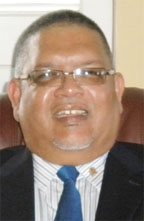Government and the private sector have fashioned a closer relationship in recent years and the two now work together “to achieve developmental objectives within the national framework whilst creating opportunities for new and existing businesses,” Chairman of the Private Sector Commission (PSC) Ramesh Dookhoo has declared in his New Year message.
Crediting himself and his predecessor, Chief Executive Officer of Roraima Airways Captain Gerry Gouveia, with nurturing an improved relationship with government, Dookhoo said that contrary to an earlier period when a lack of communication with government had served to severely constrict private sector growth, the PSC “currently communicates on a very easy basis with government in sacred strategies to enhance the socio-economic climate in our country. We can translate our concerns and problems and the issues that constrain private sector growth in a manner whereby the government can transform these into policies and programmes,” Dookhoo added.

However, the view of the head of the country’s most important private sector umbrella organisation has been challenged by members of the business community who have claimed that several of the key concerns of the business community remain unresolved despite the professed improvement in the relationship between government and the private sector.
Prominent among these outstanding private sector concerns is what sections of the business community say has been the painfully slow pace of tax reform discussions between government and the private sector. Calls by prominent members of the business community for government to hasten the process of tax reform and to pay particular attention to adjusting both income and corporate taxes levels have led to clashes with President Bharrat Jagdeo. The issue of tax reform has now been placed on the agenda of the National Competitiveness Council though the pace of progress remains slow.
In his New Year message the PSC Chairman provided no indication as to the state of play regarding the tax reform discourses, alluding instead to what he says was a partnership between the government and the private sector to engage a consultant “to review the tax study that had been commissioned by government and to recommend appropriate changes to the country’s tax structure with the objective of formatting a new tax structure that would be friendlier to the business community and the average employee without compromising government’s tax collection.”
While the message makes a brief reference to the issue of cross-border smuggling, another businessman who is also a member of the PSC told Stabroek Business that the reference fails to grasp “the seriousness of the smuggling problem and its impact on businesses in Berbice, Georgetown and other parts of the country.”
Dookhoo said in his message that the PSC had convened meetings with stakeholders in an effort to address the smuggling problem though the businessman told this newspaper that “meetings do not seem to be getting us anywhere.” Banks DIH Ltd and Demerara Tobacco, two Georgetown companies that have been particularly hard hit by smuggling have repeatedly called for stronger measures to suppress the practice.
The head of another Georgetown-based business organisation who has been involved in public/private sector discourses told Stabroek Business that it was perhaps surprising that the message made no reference to “the ongoing difficulties in the relationship between the Customs and Trade Administration and the business community. That is without question one of the more serious public/private sector issues and it would have been useful to know whether any progress had been made in removing the bottlenecks.”
Among the other developments which Dookhoo said had contributed to a more vibrant private sector were an increase in commercial bank lending for private sector initiatives, and a number of courses in various areas of business including Competition Law and Corporate Governance.





